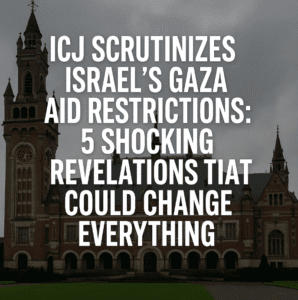ICJ Scrutinizes Israel’s Gaza Aid Restrictions: 5 Shocking Revelations That Could Change Everything
The International Court of Justice (ICJ) is examining Israel’s restrictions on UN operations in Gaza and the Occupied Palestinian Territories, triggered by catastrophic shortages of basic supplies. UN officials argue that Israel’s actions violate international law, specifically the Fourth Geneva Convention, which mandates that occupying powers ensure civilian welfare and facilitate humanitarian aid. With testimonies from 40 nations and organizations, the hearings spotlight how Israel’s policies have crippled the UN Relief and Works Agency (UNRWA), leaving 2.3 million Palestinians without vital services.
Gaza’s population faces severe food insecurity, while hospitals report children dying from malnutrition. The ICJ’s advisory opinion could increase global pressure on Israel to ease aid blockades and allow unrestricted humanitarian access. However, while the legal battle is crucial, the immediate need for aid is dire. The outcome of this case may reshape international accountability in conflict zones.

ICJ Scrutinizes Israel’s Gaza Aid Restrictions: 5 Shocking Revelations That Could Change Everything
The International Court of Justice (ICJ) this week opened historic hearings examining Israel’s constraints on United Nations operations in Gaza and the Occupied Palestinian Territories (OPT), as the enclave faces catastrophic shortages of food, medicine, and basic supplies. The proceedings, requested by the UN General Assembly, aim to clarify Israel’s legal obligations as an occupying power under international law, with testimonies from 40 nations and four organizations underscoring the gravity of the crisis.
The Legal Battle: UN Protections vs. Occupation Policies
Elinor Hammarskjöld, the UN’s Legal Counsel, emphasized that Israel’s restrictions violate longstanding international norms. She stressed that UN agencies and personnel are entitled to protections ensuring their ability to operate in conflict zones, particularly to deliver life-saving aid. Under the Fourth Geneva Convention, occupying powers must prioritize civilian welfare and facilitate humanitarian relief—a duty Israel has allegedly failed to uphold.
The hearings follow a December 2023 UN resolution, backed by 137 member states, seeking the ICJ’s advisory opinion on Israel’s conduct. While non-binding, the opinion could amplify global pressure on Israel to ease aid blockades and cease hostilities. Hammarskjöld reiterated calls for an immediate ceasefire, hostage release, and unfettered aid access, citing the deaths of 295 UN staff in Gaza since October 2023.
UNRWA’s Crippled Operations
Philippe Lazzarini, Commissioner-General of the UN Relief and Works Agency (UNRWA), detailed how Israel’s “no-contact” policy has paralyzed the largest aid provider in Gaza. Since January 2024, Israel has barred visas for UNRWA’s international staff and restricted coordination, severing a lifeline for 2.3 million Palestinians. With over 150 UNRWA facilities damaged or destroyed, the agency’s ability to deliver food, healthcare, and education has plummeted.
“We’re not just fighting bureaucracy—we’re fighting a policy designed to erase our presence,” Lazzarini stated. UNRWA’s schools-turned-shelters now house 1.7 million displaced Gazans, many surviving on one meal a day.
Voices from Gaza: “We Are Slowly Dying”
Testimonies collected by UNRWA reveal a population pushed to the brink:
- Mona, a grandmother in Gaza City, splits moldy flour into tiny loaves to feed her family. “I give my bread to the children. Medicine is pointless without food,” she said.
- Wafaa, a mother sheltering with her young children, subsists on expired canned goods. “When will this nightmare end?” she asked.
Jonathan Whittall of OCHA described a “suffocating” blockade: “People aren’t just killed by bombs—they’re dying from hunger and disease.” Israel’s March 2024 decision to seal Gaza’s borders halted even commercial imports, collapsing markets and leaving aid groups unable to source basics like flour locally.
Why This Case Matters
The ICJ’s opinion could redefine accountability for occupying powers, reinforcing that international law cannot be sidelined during conflicts. Past advisory opinions, like the 2004 ruling against Israel’s separation wall, have shaped diplomatic discourse despite their non-binding nature.
For Gaza, the stakes are existential. Over 90% of its population faces acute food insecurity, while hospitals report children dying from malnutrition-related complications. Experts warn that without urgent aid, famine could be declared within weeks.
The Path Ahead
While the ICJ deliberates, aid groups urge immediate action. “Legal clarity is vital, but Gaza needs food today—not tomorrow,” said Lazzarini. The UN Security Council remains deadlocked, leaving the ICJ as one of the few platforms to address violations.
As the world’s highest court weighs in, the hearings spotlight a stark reality: the collapse of humanitarian systems in Gaza isn’t just a legal failure—it’s a moral one.
- ICJ’s Role: The court’s advisory opinion could pressure Israel to comply with humanitarian law, though enforcement remains challenging.
- UNRWA’s Crisis: Without visa renewals and access, Gaza’s primary aid provider risks collapse.
- Human Toll: Civilians endure starvation, displacement, and trauma, with no safe haven from violence.
- Global Implications: The case tests the international community’s commitment to upholding humanitarian principles in protracted conflicts.
The ICJ hearings are a critical step toward accountability, but for Gazans like Mona and Wafaa, justice hinges on the world’s willingness to act—not just deliberate.
You must be logged in to post a comment.